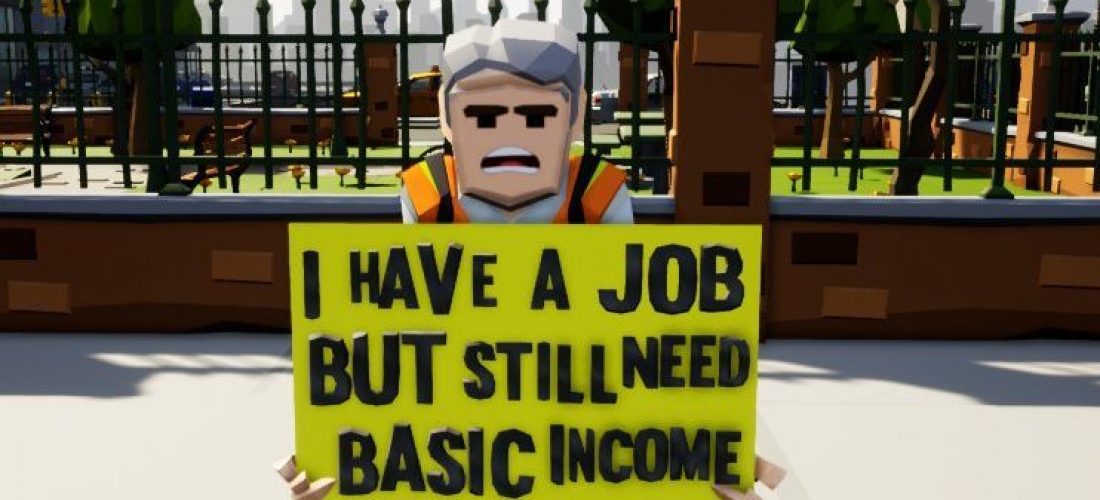In the 1940s, when the International Harvester M12H tractor made human cotton pickers redundant, hundreds of thousands of Mississippi sharecroppers migrated north and found work on factory assembly lines making tanks, trucks, and cars. Losing their job on the farm proved no hardship. Backbreaking labour became merely tedious work and union wages transformed the grandchildren of slaves into middle class Americans. And their departure from the plantation had no negative effect on cotton production. Today, a single six-row harvester with a crew of four can pick as much cotton in a day as 1000 people used to by hand.
That is how capitalism’s creative destruction is supposed to function. Labour saving technology frees up workers who then move to better paying, more productive jobs elsewhere. When the internal combustion engine replaced the horse drawn carriage, Western Massachusetts’ once thriving buggy whip factories closed but Henry Ford’s River Rouge plant opened and both the number and quality of jobs increased. Of course, not everybody wins: the owner of the buggy whip factory and his specialist craftsmen lost money and status but society as a whole was better off. Progress is a good thing. That is why Luddite is an epithet.
Today, productivity increases are eliminating jobs but so far not creating new and better ones. If they are lucky, laid off steelworkers (or middle managers) get jobs in fast food restaurants, paying a fraction of their previous wage. A college friend of mine, let go from a high paying Wall Street public relations gig had to take a job slicing bologna at his local supermarket. Today he works for a non-profit but will probably never earn as much as he did when he was 40 years old.
In my own industry of television news, back when I started, it required the labour of six employees (a reporter, a producer, a cameraman, a soundman, an editor, and a satellite or transmission engineer) to put a story on air. Today, lightweight cameras, laptop editors, and satellite data transmitters allow one person to do the work of all six, usually for a lower wage than any one of us was paid back in the day. Modern technology allows almost anyone to make a documentary and exhibit it online but while documentary making used to pay a middle class wage, now for most of its practitioners it has to be a labour of love rather than a job.
Most economists continue to be optimistic, confident that capitalism’s dynamism means those good new jobs are right around the corner. Perhaps they are right. But I am beginning to think we have been bamboozled by the successes of the last century, when peasants all over the world abandoned the farm for higher paying, more productive jobs in factories. Maybe that was a one off, a happy coincidence that a declining need for farmhands coincided with a rising demand for factory workers. Creative destruction may eventually create jobs but it could take a while. The grandsons of Newcastle ship builders still are waiting.
We are naïve if we expect new better jobs to emerge just because old jobs are disappearing. At its peak Eastman Kodak employed 145,000 workers. Instagram employed 19 when it was sold to Facebook for $1 billion. Today’s decentralized firms need fewer workers. With the rise of robotics even more jobs will be lost. So far policymakers have just been waiting and hoping. Instead, we need to start thinking about what to do if those better jobs don’t emerge. We need to imagine a world with less work. Fortunately, that world need not be less prosperous.
Even if they don’t create new jobs, productivity increases do make all of us collectively richer. The docks of the Port of New York and New Jersey are busier today than they were when Marlon Brando filmed On the Waterfront. More cargo is unloaded and the cost to the consumer is considerably lower even as longshoremen’s’ jobs have evaporated. Containerized technology means the ship gets unloaded more cheaply but the man doing the heavy lifting is now free to do something else. In theory, he can become a painter/decorator or a personal trainer or a bodyguard. The dilemma, of course, is that those jobs don’t pay as well.
And there we have the heart of the problem. Factory work is hot, hard, and boring. We can romantise it now that it is almost gone but few workers at the time felt much affection for their jobs. If the pay and security were the same, who wouldn’t rather be a dog walker or personal shopper or masseuse than a steelworker? We miss manufacturing because those jobs paid good salaries.
It is worth remembering that the now disappearing manufacturing jobs were well paid mostly because these jobs were unionized. There is no intrinsic link between manufacturing work and decent wages, as workers in Manchester 150 years ago and workers in Bangladesh today will attest. In Las Vegas, where service workers have unions, hotel maids can afford a middle class lifestyle. Elsewhere, where unions are weaker, maids live much closer to the poverty line. Manufacturing jobs paid well for political as much as for economic reasons. Unionization is easier when all employees work together in one place. And from the end of World War II to the rise of Reagan/Thatcher, all the mainstream political parties made full employment their priority. In such a situation workers’ bargaining position was much stronger than it is today.
As automation continues apace, more and more repetitive standardized jobs will continue to disappear. Perhaps they can be replaced by service jobs that require a human touch. Unfortunately no one but an oligarch can afford to pay a dog walker or a guitar teacher the same steady wage that a steelworker earned. Perhaps part of the solution is guaranteeing every citizen a basic income. Not only will this create a genuine safety net and provide countercyclical demand during downturns, it also gives employers a subsidy for hiring lower wage workers.
Considering their low margins, if high street stores paid their employees a living wage, they would have to raise their prices, which would reduce sales and could even lead to bankruptcy. A government subsidy in the form of a basic income for all citizens shifts the income distribution towards poorer people without affecting firms’ hiring costs. Two income households would be more able to afford a nanny to take care of their children (and the nanny would make more money) if her salary was augmented by a basic income provided by the government.
A basic income could also be a first step to improve workers’ bargaining power. If owners are able to hold down wages because of the “reserve army of the unemployed”, then workers certain of a basic income that will allow them to feed their children will have less need to kowtow to their bosses.
On a deeper level, though, perhaps we should take this opportunity to rethink our attitude towards work. Technological progress means we no longer need to work from sun up to sundown to earn our daily bread. We can work less, spend more time on leisure activities, or on raising our kids. Society is now rich enough to provide food and shelter to all its members. Never ending productivity increases mean that we can make more and more with less labour. Maybe then, we should start working less. A shorter workweek, more flextime would immeasurably improve most people’s lives. But first, we must stop assuming that creative destruction will magically cause new and better jobs to materialize.
Tratto da Pieria







